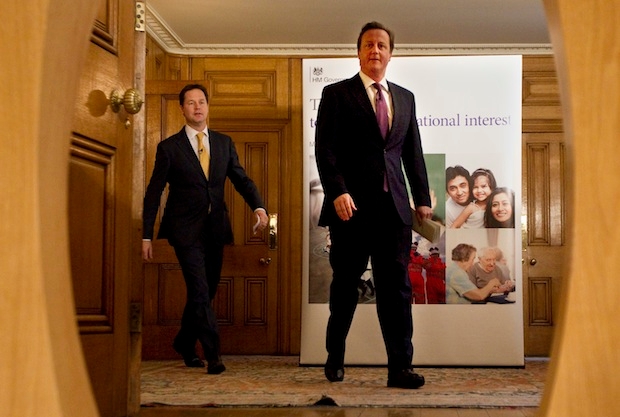Conservatives have been returning to their Westminster offices this week to find the wind behind them. Something suddenly seems to be going right: there’s good news on the economy, jobs and immigration and Labour seems to be in gentle meltdown. The idea of an outright majority in a 2015 election suddenly seems a lot more plausible.
Which is why ministers and advisers are so dismayed at reports last week that David Cameron was planning for a second coalition after 2015. Just when a Tory election victory seemed possible, the Prime Minister has been mulling over a change in party rules so that MPs could vote on a new coalition agreement. Cameron was fortunate that his backbenchers were relaxing with their buckets and spades when the story broke: if parliament had been sitting it would have caused an almighty row in the party.
Cameron’s ministers, far from joining the Prime Minister in planning a second coalition, would much rather imagine how wonderful life could be without the Lib Dems. Take Chris Grayling, the Justice Secretary. For some time, he has been working on a detailed, true blue human rights policy to be unveiled in the coming weeks. Grayling is privately puzzled by Labour and Lib Dem willingness to sign in blood their support for the European Court of Human Rights given its huge unpopularity. He’d like to explain, before the election, how much better things could be without the Lib Dems — and that could include breaking free from Strasbourg. His Lib Dem justice minister, Lord McNally, is aware of this. The two have agreed to plough their own party furrows, while working together on the modest ECHR reforms secured by Ken Clarke last year.
Theresa May, who recently supplanted Boris Johnson as the bookmakers’ favourite to succeed Cameron, has her own plans. She too will plug a Tory vision on human rights and immigration this autumn, listing policies intended to be popular with voters and rejected by the Lib Dems. Home Office Tories are also wryly amused that their coalition partners listed the fall in immigration as one of their achievements in a recent party publication, given the fuss they made about such targets before the election.
The party chairman, Grant Shapps, is expected to fly a few more Tory kites after the conference season. Downing Street might also make use of its policy board of MPs (including Jo Johnson) who have been consulting colleagues on ideas to secure a majority. But there is a slight worry in No. 10 that the current group has not quite clicked. There haven’t been open disagreements between its members, but I’m told they have not really bonded.
Nick Clegg’s office is ready for the Tory hostilities. For their part, the Lib Dems have been happily highlighting their differences with the Tories for some time and at their conference next month will probably list their achievements. But at cabinet level, both sides are keen to focus on disputes over policy, rather than character assassination. Both recognise that the recent row over relaxing childcare ratios (where Nick Clegg vetoed plans by the Tory education minister Liz Truss) made the coalition look like a disorganised, bickering couple. Many cabinet ministers enjoy good relationships with their Lib Dem juniors: Iain Duncan Smith and Steve Webb, for instance, are known to work very well together.
But more junior ministers, of both parties, look forward to when they can do the political equivalent of a kiss-and-tell — they reveal how their coalition partners didn’t just block policies, but also made the process of governing more gelatinous. One, frustrated by the length of time it takes for Nick Clegg’s busy office to make a decision, suggests that Tories should be clear that coalition is the enemy of decisive government. Others would like to make it known that squabbles with the Lib Dems led to a Green Deal which costs voters a lot more than they’d hoped.
In private, MPs often remark that ‘there’s a story to be told about how the Lib Dems messed up’ one policy or another: some would quite like such stories to become public. Few have leaked so far. But getting personal would be a gamble: the Lib Dems don’t lack embarrassing stories of their own to tell about the Tories in government. Such a policy could end up with mutually assured destruction.
The ammunition pile is mounting. Letters are building up, in ministerial desks all over Whitehall, which spell out coalition colleagues’ private dislike of certain policies. One aide fears that as the election approaches, ministers will retrieve memos showing that a Lib Dem blocked a policy that the Tory grassroots would have loved. Or a Lib Dem will brandish a letter as evidence that the Tories would have been even more heartless if left to their own devices. An unwritten rule about not leaking memos has, so far, been upheld. But as Liam Byrne discovered when he left a note for his successor at the Treasury joking about there being ‘no money’ left, all’s fair in love and political rivalry.
Over the summer, the coalition partners left each other alone and focused on goading Labour. It’s been fun for them. But the closer Tories believe they are to an outright victory at the next election, the more vicious they are likely to be towards their coalition partners when the time is right. There’s little chance of those kiss-and-tell letters being thrown away just yet.







Comments